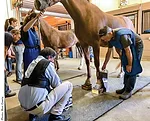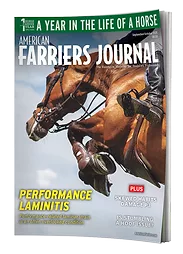Advertise Follow Us
Items Tagged with 'vet-farrier relationship'
ARTICLES
Measuring Feet & Other Highlights from the AFA Convention
The 2024 American Farrier’s Association convention was filled with equine professionals eager to learn and share their knowledge
Read More
Better Vet-Farrier Communication Leads to Better Hoof Care
Resolve points of conflict through education & open dialogue
Read More
Helping the Horse Through Effective Vet-Farrier Communication
Understanding sources of friction can help foster open dialogue & overcome barriers
Read More
3 Common Causes for Failure of the Veterinarian-Farrier Relationship
Recognize and avoid situations in which either party inadvertently contributes to losing focus on the horse
Read More
Joint Practitioner Educational Clinics: Win-Win for Clients and Their Horses
Case discussion builds camaraderie and helps reinforce professional boundaries
Read More
New & Notes
Clinic And Competition Builds Better Vet-Farrier Bridges
The Spring Farrier Clinic at Iowa State University brought farriers and vet students together to investigate ways to work together.
Read More
Vet, Farrier Tackle Tough Abscess Case
Retired barrel racing horse suffers severe bruising, abscesses after pulling shoes
Read More

.webp?height=125&t=1740082949&width=150)











